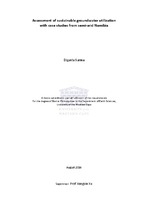Assessment of sustainable groundwater utilization with case studies from semi-arid Namibia
Abstract
The thesis addresses sustainability of groundwater utilization in arid and semiarid regions of Namibia. Recharge in this hydrogeological setting occurs as discrete events to aquifers that are bounded in extent. Case studies involving fractured hardrock and alluvial aquifers with aquifer-ephemeral river interaction were considered. The nature of recharge to arid region bounded aquifers was explored. In arid region aquifers, roundwater storage is depleted during extended dry periods due to pumping and natural discharge. Steady state conditions are rarely achieved. With lowering of the water table, evapotranspiration is reduced thus decreasing aquifer discharge. However, depletion of ephemeral river flow is the primary source of water to boreholes. Physical constraints such as river bed and aquifer hydraulic properties set a limit to the degree of natural replenishment possible during flow events. An approach to assessing sustainable yield of a fractured rock aquifer associated with ephemeral river flow is discussed using a case study from rural semi-arid Namibia. Limited data required the simulation results to be verified against geological and hydrogeological constraints. The aquifer’s gain in storage is estimated through numerical simulation. It provides a basis for groundwater scheme management that rely on limited data in semi-arid conditions in sub-Saharan Africa. Aspects related to ephemeral river flow and groundwater recharge to strip alluvial aquifers was addressed in the second case study. The processes controlling infiltration, significance of surface water and groundwater losses, and possible artificial recharge options were investigated through numerical simulation. It was concluded that recharge processes in arid alluvial aquifers differ significantly from those in humid systems. Conjunctive use of surface and groundwater resources require artificial augmentation of aquifer recharge due to constrains in natural infiltration rates. The study provides a reference for sustainable management of alluvial aquifer systems in similar regions. It is seen from the study that high rates of groundwater exploitation deplete surface water resources needed downstream while failure to capture surface flow during flood events cause loss of potential recharge. It is concluded that as water demand in Namibia increases, basin wide combined surface water and groundwater resource evaluation and management have become a
necessity.

